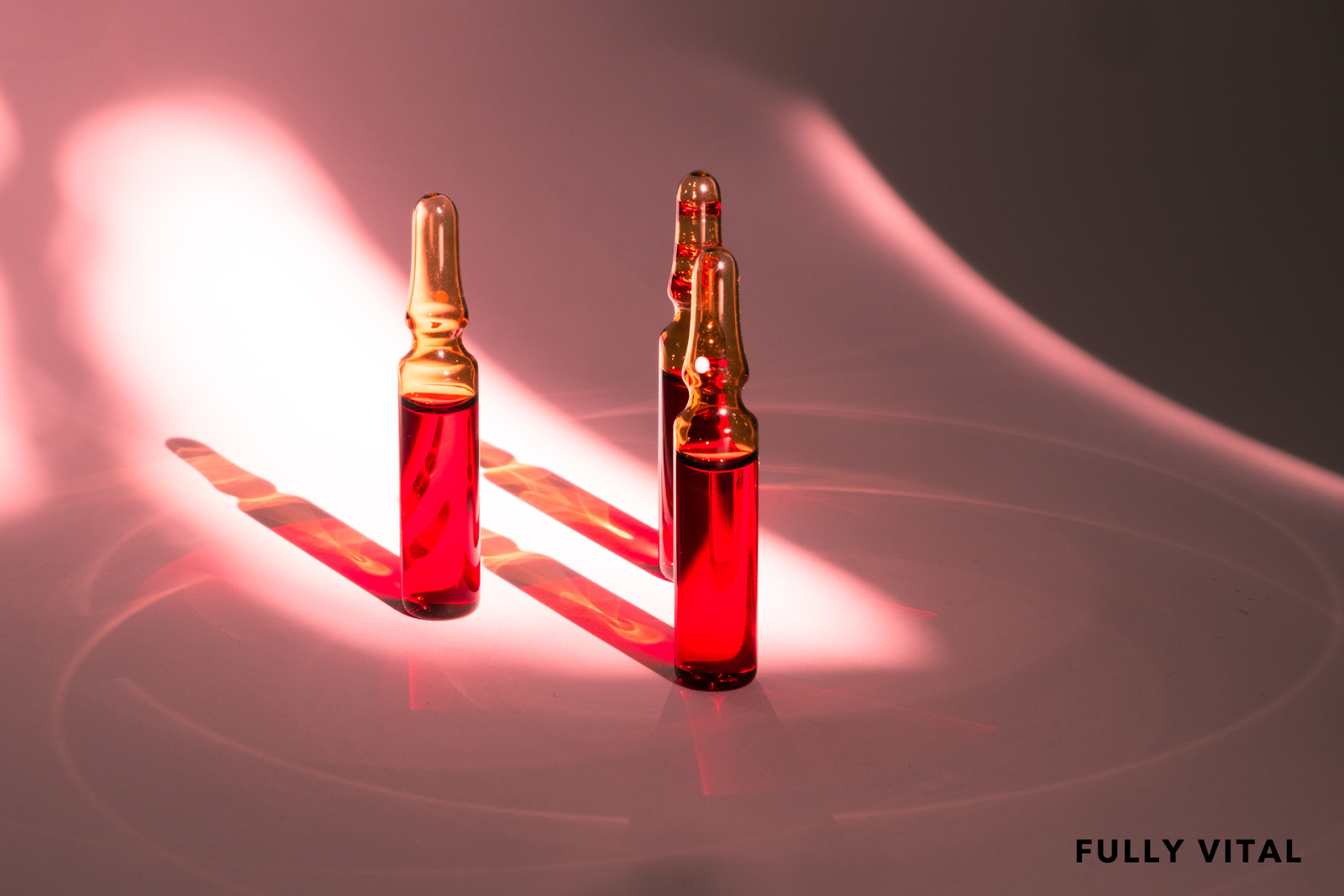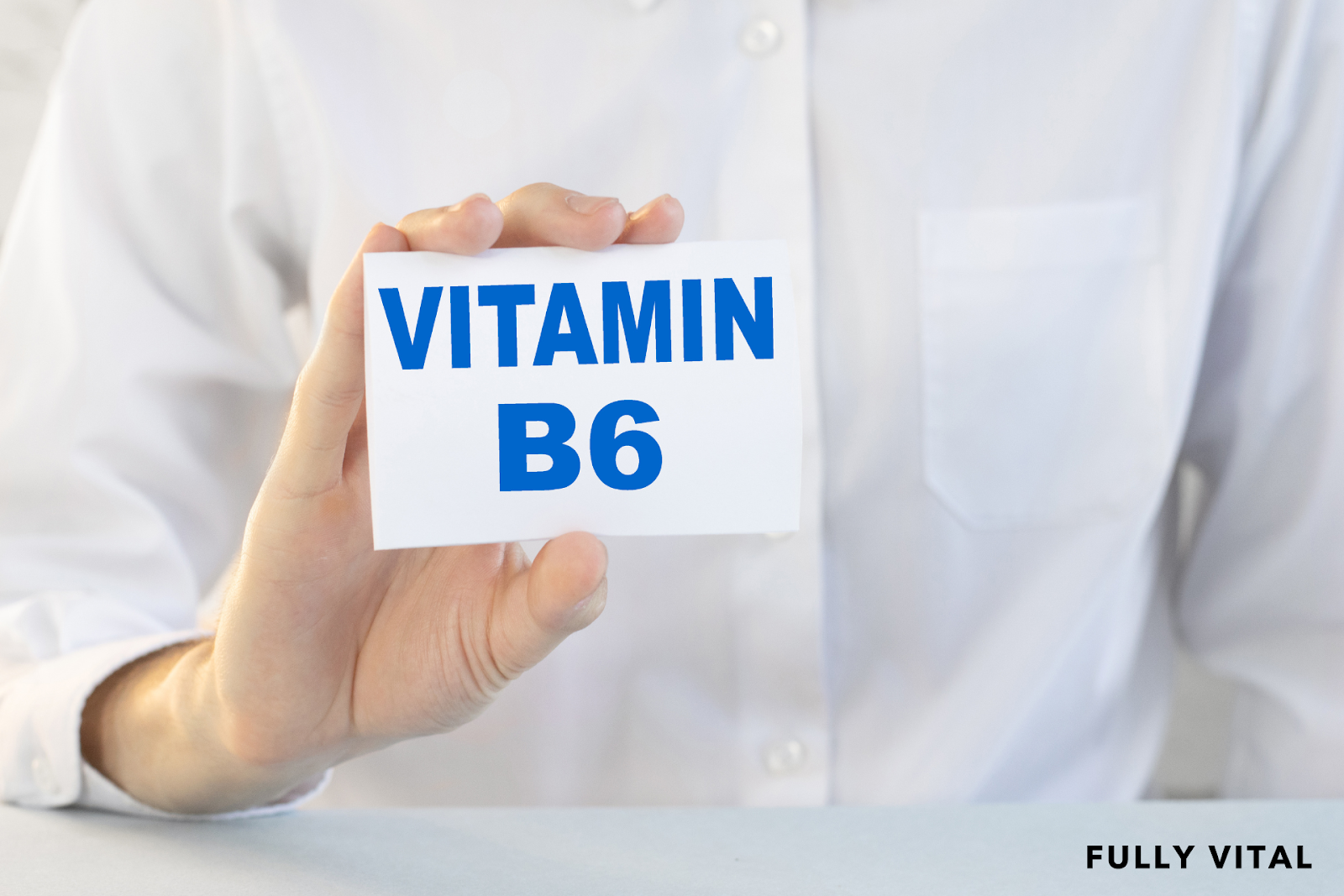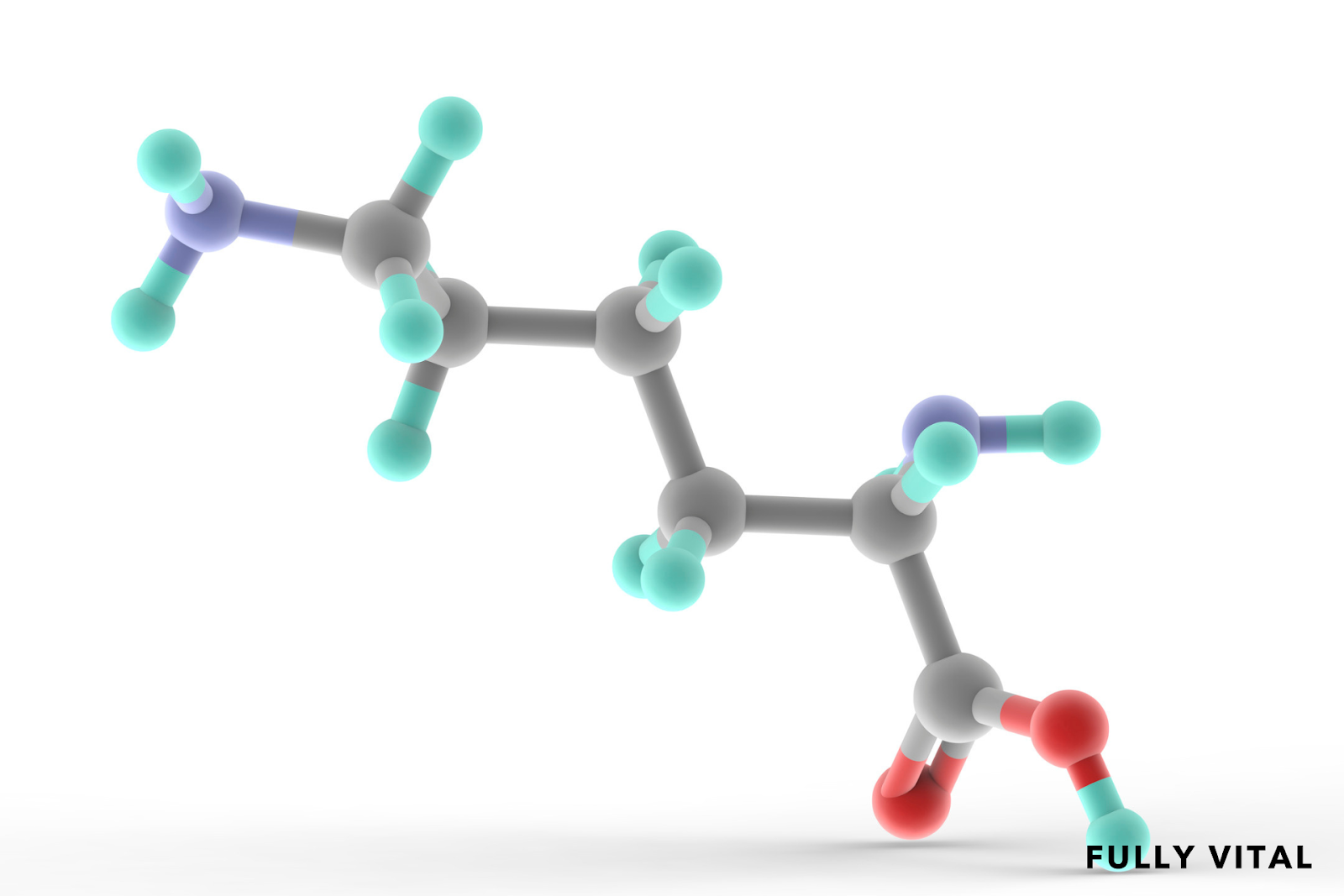
Vitamin B12: Energizing Your Hair from Roots to End
When it comes to hair health, nutrients like keratin and biotin often grab the spotlight.
However, there's a less talked about yet equally essential nutrient that deserves attention—Vitamin B12.
This powerhouse vitamin is crucial for keeping your hair strong and full of life, but its importance often flies under the radar.
Vitamin B12, a key player in the production of red blood cells, directly impacts hair by providing nourishment to the follicle.
Without an adequate supply, hair growth can stall, and existing strands may weaken.
In this article, we explore the numerous ways Vitamin B12 supports your locks from the roots to the ends.
In the following sections, we'll walk through the essential information you need to energize and fortify your hair with the power of Vitamin B12.
Let's dive in and uncover the connection between Vitamin B12 and the vitality of your hair.

I LOVE MY HAIR NOW
FullyVital hair serum and hair vitamins made tremendous improvements in my hair. I truly love my hair now.
Shop Hair ProductsWhat Exactly Is Vitamin B12?
Vitamin B12, also known as cobalamin, is a water-soluble vitamin that plays a pivotal role in the functioning of the brain and nervous system, the formation of blood, and the metabolism of every cell in the human body.
It's particularly important for the creation of DNA and for maintaining healthy nerve cells—a factor that can also influence hair health.
The Role of Vitamin B12 in the Body
Vitamin B12 contributes to the production of energy by helping the body absorb folic acid and by participating in the synthesis of fatty acids and amino acids.
A deficiency in Vitamin B12 can lead to anemia, which is when the body doesn't have enough red blood cells to transport oxygen efficiently.
This inefficiency can directly impact hair growth and health, as hair follicles require a rich supply of oxygenated blood to thrive.
Natural Sources of Vitamin B12
The body doesn't produce Vitamin B12, so it needs to be sourced from diet or supplements.
Natural sources of Vitamin B12 typically include animal products, such as meat, fish, dairy, and eggs.
For those on a plant-based diet, fortified foods or supplements are crucial to prevent a deficiency, as few plant foods contain substantial amounts of B12.
How Does Vitamin B12 Influence Hair Health?
Vitamin B12's role in hair health is often underestimated.
Adequate levels of this vital nutrient can promote hair growth and possibly prevent hair loss.1
Let's explore the mechanisms by which Vitamin B12 can energize and fortify hair from roots to ends.
Vitamin B12's Impact on Hair
One of the primary ways Vitamin B12 impacts hair is by supporting the health of red blood cells, which carry oxygen to tissues, including hair follicles.
Hair follicles with sufficient oxygen supply can produce and maintain healthy hair strands.
On the contrary, a lack of B12 can result in reduced red blood cell production and lead to the hair follicles receiving insufficient oxygen, weakening the hair.
What Does Science Say About Vitamin B12 and Hair Growth?
While the anecdotal evidence supporting Vitamin B12's role in hair health is compelling, it's important to consider what scientific research has to say about this relationship.
Investigating the available studies provides us with a clearer understanding of how significant Vitamin B12 is for maintaining luxurious hair.
Research Highlights on Vitamin B12 and Hair
A number of studies have suggested a link between Vitamin B12 and hair health.
Research indicates that Vitamin B12 may aid in the prevention of hair loss, with deficiencies associated with various hair-related problems, including alopecia areata, a condition where the immune system attacks hair follicles.2
While more extensive studies are needed, the evidence points towards the importance of maintaining adequate levels of Vitamin B12 for optimal hair growth.
Synergy with Other Hair-Beneficial Nutrients
Vitamin B12 doesn't work in isolation when it comes to hair health.
It operates in concert with other B-vitamins, such as biotin and niacin, to promote stronger hair.
Additionally, the interplay between Vitamin B12, iron, and zinc is crucial; a lack in any of these nutrients can significantly affect hair growth and health.
Therefore, a holistic approach to nutrition, ensuring a balanced intake of these vitamins and minerals, is essential for maintaining healthy hair growth.

What Happens When You’re Deficient in Vitamin B12?
Identifying Deficiency Symptoms
Apart from the telltale hair health issues like slow hair growth and increased shedding, a lack of Vitamin B12 can manifest in general symptoms that often get misattributed to other conditions.
These symptoms include fatigue, pale skin, sensations of pins and needles, vision problems, irritability, depression, and cognitive disturbances like memory loss.
Since these symptoms can be quite broad, it's critical not to overlook the possibility of a B12 deficiency, especially if you're at risk or exhibit multiple signs.
The Long-Term Effects on Hair
Persistent Vitamin B12 deficiency doesn't just affect the hair temporarily; it can have long-term repercussions.
Without intervention, the deficiency can lead to the hair follicles receiving less oxygenated blood, impeding new hair growth and leading to weaker strands that fall out more easily.3
Over time, this can result in noticeably thinner hair, and in severe cases, can contribute to chronic hair loss.
It's essential to be vigilant about potential Vitamin B12 deficiency signs, especially because this condition is often correctable through diet or supplementation.
For those concerned about hair health and overall wellbeing, ensuring adequate intake of Vitamin B12 is a crucial aspect of any health maintenance regime.
How Can You Enhance Your Hair Health with Vitamin B12?
Ensuring your hair has the right amount of nutrients is critical, and when it comes to Vitamin B12, there are practical ways to bolster your intake for hair health.
Whether through dietary changes or supplementation, boosting your Vitamin B12 levels can contribute to stronger, healthier hair.
Changing Your Diet for Better Hair
Diet plays a crucial role in providing your hair with the necessary nutrients.
To increase Vitamin B12 intake through food, consider adding more animal-based products like lean meats, poultry, fish, eggs, and dairy to your diet—these are all rich in B12.
For vegetarians and vegans, fortified foods such as plant-based milks, cereals, and nutritional yeast are viable options.
Including these foods in your daily meals can lead to significant improvements in hair health over time.
Considering Supplementation and Treatment
If dietary changes are not enough or if you're among those who have trouble absorbing Vitamin B12 from food (like older adults or those with certain medical conditions), supplementation might be necessary.
Vitamin B12 supplements come in various forms, including tablets, sublingual drops, and injections.
Consulting with a healthcare professional is advised before starting any supplementation, as they can help determine the correct dosage and form for your unique needs.

Unlock the Key to Timeless, Lustrous Hair!At Fully Vital, our objective is to assist you in embracing the timeless beauty of your hair. Our scientifically supported hair growth products are crafted to reverse the aging process and breathe new life into your locks, allowing you to cultivate a healthier, more vibrant connection with your hair. Highlighted Features:
Accompany us on the expedition to rediscover the vitality of your hair. Your hair deserves to look and feel its finest, and we're here to bring that to fruition! |
Final Thoughts On Vitamin B12
The link between Vitamin B12 and hair health is both significant and undeniable.
From fostering red blood cell production to facilitating the division of hair follicle cells, this nutrient proves to be a cornerstone in maintaining and potentially enhancing hair vitality.
Adequate intake of Vitamin B12 can lead to fuller, healthier hair and potentially reverse some of the effects of hair thinning and loss due to deficiency.
It's crucial to heed the early signs of deficiency, not only for the sake of your hair but for your overall health.
Whether through thoughtful dietary choices or supplementation, ensuring you have enough Vitamin B12 is a wise investment in your wellbeing.
While everyone's needs may differ slightly, the path to healthier hair could be as simple as paying closer attention to this all-important vitamin.
Remember, the journey to optimal hair health is multifaceted—encompassing nutrition, proper hair care, and sometimes medical intervention.
Vitamin B12 is just one piece of the puzzle, but it's one that carries a weight of benefits that should not be overlooked.
Check out our recent blogs:
- Keratolytic Agents: Everything You Need To Know
- Essential Fatty Acids: The Key To Stimulating Hair Growth
- Triangular Alopecia: Understanding The Patchy Hair Loss Condition
Frequently Asked Questions About Vitamin B12
What is the recommended daily amount of Vitamin B12 for healthy hair?
For adults, the recommended dietary allowance (RDA) of Vitamin B12 is approximately 2.4 micrograms, though the exact amount can vary based on age and other factors.
Do Vitamin B12 levels affect hair texture or color?
While Vitamin B12 is not known to affect hair texture, a deficiency could potentially lead to premature graying.
How quickly can a deficiency in Vitamin B12 be rectified?
With proper supplementation or dietary adjustments, Vitamin B12 levels can begin to improve within a few days, but it may take longer for symptoms to alleviate.
Can Vitamin B12 deficiency be mistaken for other conditions?
Yes, because the symptoms are non-specific, it can be mistaken for various other conditions, making it important to test for deficiencies.
Is it safe for pregnant or breastfeeding women to take Vitamin B12 supplements?
Yes, it is generally safe but necessary for pregnant and breastfeeding women to prevent potential birth defects and support the baby's growth.
Can high-stress levels deplete Vitamin B12?
Stress does not deplete Vitamin B12 levels, but it can exacerbate the symptoms of a deficiency.
What are the signs that your body is responding well to increased Vitamin B12 intake?
Signs include improved energy levels, a reduction in hair loss, and possible hair regrowth over time.
Is it possible to test for Vitamin B12 levels at home?
Yes, there are home test kits available, but for accurate diagnosis, professional testing by a healthcare provider is recommended.
Can certain medications interfere with Vitamin B12 absorption?
Yes, certain medications, such as antacids and some type 2 diabetes medications, can interfere with B12 absorption.
Are there any specific hair care practices that complement the benefits of Vitamin B12 for hair health?
Yes, gentle hair care practices that minimize damage, alongside a healthy diet rich in Vitamin B12, can maximize hair health benefits.
Sources:
- Almohanna, H. M., Ahmed, A. A., Tsatalis, J. P., & Tosti, A. (2019). The Role of Vitamins and Minerals in Hair Loss: A Review. Dermatology and Therapy, 9(1), 51–70. https://doi.org/10.1007/s13555-018-0278-6
- Thompson, J. M., Mirza, M. A., Park, M. K., Qureshi, A. A., & Cho, E. (2017). The Role of Micronutrients in Alopecia Areata: A Review. American Journal of Clinical Dermatology, 18(5), 663–679. https://doi.org/10.1007/s40257-017-0285-x
- Kannan, R., & Ng, M. J. M. (2008). Cutaneous lesions and vitamin B12 deficiency: an often-forgotten link. Canadian Family Physician Medecin de Famille Canadien, 54(4), 529–532. https://www.ncbi.nlm.nih.gov/pmc/articles/PMC2294086/








